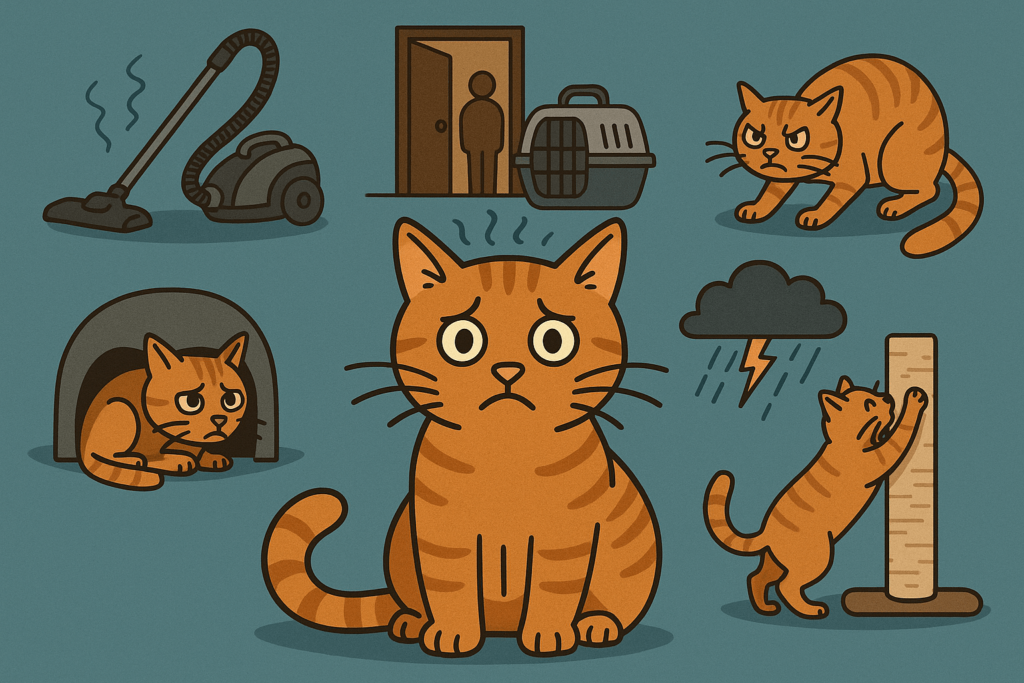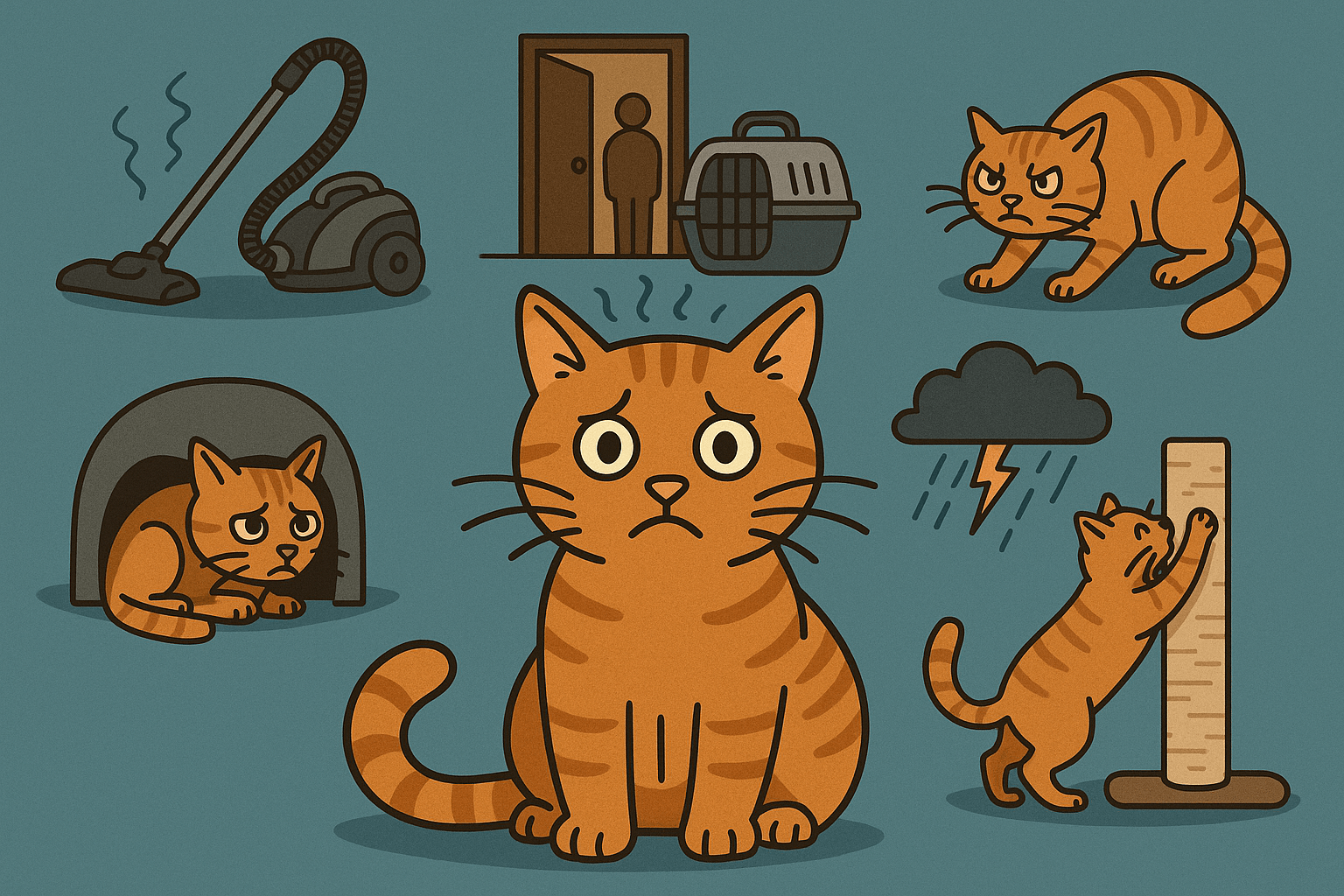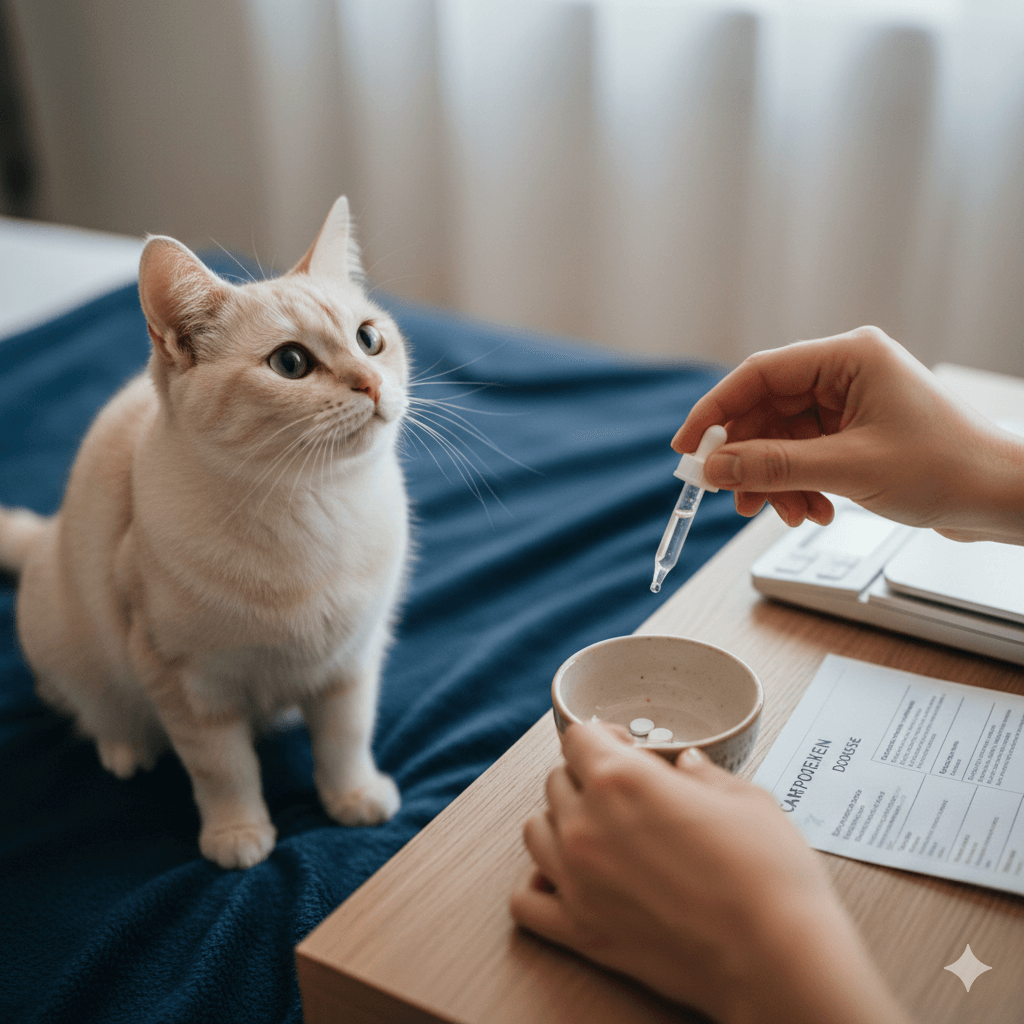Understanding Anxiety in Cats
Cats are often seen as independent and self-sufficient creatures, but they can experience anxiety just like humans and other animals. Anxiety in cats can stem from a variety of factors, including changes in their environment, health issues, or even past trauma. Recognizing the signs of anxiety is crucial for ensuring your feline friend feels safe, secure, and happy. Whether you’re dealing with a shy kitten or an anxious adult cat, understanding their behavior and knowing how to address their needs can make all the difference. In this blog post, we’ll explore the causes, symptoms, and solutions for anxiety in cats, helping you create a calm and supportive environment for your beloved pet.
Common Causes of Anxiety in Cats
Anxiety in cats doesn’t appear out of nowhere—it’s often triggered by specific stressors in their environment or lifestyle. Identifying these triggers is the first step toward addressing your cat’s anxiety effectively.
Changes in Routine:
Cats thrive on consistency, so sudden changes in feeding times, play schedules, or household routines can leave them feeling unsettled.New Environments:
Moving to a new home, rearranging furniture, or introducing unfamiliar scents can overwhelm cats and lead to anxiety.Loud Noises:
Fireworks, thunderstorms, or construction sounds can startle sensitive cats and cause prolonged stress.Introduction of New Pets:
Bringing a new animal into the home can disrupt your cat’s sense of territory and security, leading to tension and anxiety.Health Issues:
Underlying medical conditions, such as pain or illness, can manifest as anxiety. Always rule out physical causes with a vet visit.
By pinpointing the root cause of your cat’s anxiety, you can take targeted steps to alleviate their discomfort and restore their peace of mind.

Signs Your Cat May Be Experiencing Anxiety
Cats are masters at hiding their emotions, but there are subtle behavioral cues that can reveal their inner turmoil. Look out for these signs to determine if your cat is struggling with anxiety.
Excessive Grooming:
Over-grooming, especially to the point of causing bald patches, is a common sign of stress in cats.Hiding Behavior:
A cat that suddenly spends more time hiding under furniture or in secluded areas may be feeling anxious.Aggression:
Uncharacteristic aggression toward people or other pets can indicate underlying stress or fear.Loss of Appetite:
Refusal to eat or drink is a red flag that your cat may be experiencing emotional distress.Increased Vocalization:
Excessive meowing, yowling, or growling can signal anxiety, particularly if it occurs at unusual times.
Recognizing these signs early allows you to intervene promptly and provide your cat with the support they need to feel safe again.
Check this guide 👉Cat Anxiety Symptoms: Best 7 Expert Tips!
Check this guide 👉Understanding Cat Separation Anxiety: Best 7 Expert Tips!
Check this guide 👉Why Is My Cat Scared of Strangers? Best 7 Behavior Tips!
Behavioral Signs of Anxiety | Possible Solutions |
|---|---|
Excessive grooming | Provide calming pheromone diffusers |
Hiding or avoidance | Create safe spaces with cozy bedding |
Aggression toward others | Gradually reintroduce pets or people |
Loss of appetite | Offer favorite foods or wet treats |
Increased vocalization | Play soothing music or white noise |
How to Calm an Anxious Cat
Helping your cat manage anxiety requires patience, consistency, and a focus on creating a stress-free environment. These strategies can make a significant difference in your cat’s well-being.
Provide Safe Spaces:
Designate quiet areas where your cat can retreat when feeling overwhelmed, complete with soft bedding and familiar scents.Use Pheromone Products:
Synthetic feline pheromones, available as sprays or diffusers, mimic the calming scents cats naturally produce.Establish a Routine:
Stick to consistent feeding, play, and sleep schedules to give your cat a sense of stability and predictability.Engage in Playtime:
Interactive toys and games can distract your cat from stressors while providing much-needed mental stimulation.Limit Exposure to Triggers:
Identify and minimize exposure to stress-inducing factors, such as loud noises or unfamiliar visitors, whenever possible.
By implementing these calming techniques, you can help your cat regain their confidence and enjoy a happier, more relaxed life.
When to Consult a Veterinarian About Anxiety
While many cases of anxiety in cats can be managed at home, some situations require professional intervention. Knowing when to seek help ensures your cat receives the care they need.
Persistent Symptoms:
If your cat’s anxiety symptoms don’t improve despite your efforts, it’s time to consult a vet for further evaluation.Physical Health Concerns:
Anxiety can sometimes mask underlying medical issues, so a thorough check-up is essential.Severe Behavioral Changes:
Sudden or extreme changes in behavior, such as aggression or withdrawal, warrant immediate attention.Difficulty Eating or Drinking:
Prolonged refusal to eat or drink can lead to serious health complications and should not be ignored.Unexplained Weight Loss:
Significant weight loss accompanied by anxiety could indicate a deeper issue requiring veterinary care.
A vet can offer guidance, recommend treatments, or refer you to a feline behaviorist for specialized support.
Common Misconceptions About Anxiety in Cats
There are several myths surrounding anxiety in cats that can hinder proper care. Understanding the truth behind these misconceptions helps you better support your pet.
Myth: Cats Don’t Get Stressed Like Humans Do:
While cats express stress differently, they are just as susceptible to anxiety as humans and other animals.Myth: Only Outdoor Cats Experience Anxiety:
Indoor cats can also develop anxiety due to factors like boredom, lack of stimulation, or environmental changes.Myth: Anxiety Is Always Obvious:
Cats are experts at masking their emotions, so anxiety may present subtly through behavioral changes.Myth: Medication Is the Only Solution:
Many cases of anxiety can be managed through environmental enrichment, routine adjustments, and non-medical interventions.Myth: Older Cats Are Naturally More Anxious:
While aging can bring challenges, anxiety in senior cats often stems from health issues or sensory decline rather than age alone.
Dispelling these myths empowers you to approach your cat’s anxiety with knowledge and empathy.
Environmental Enrichment for Anxious Cats
Providing mental and physical stimulation is a powerful way to reduce anxiety in cats. Environmental enrichment keeps them engaged and helps redirect nervous energy.
Interactive Toys:
Toys that move, crinkle, or dispense treats encourage exploration and play, reducing boredom-related stress.Vertical Spaces:
Installing cat trees or shelves gives anxious cats a sense of control and height, which can boost their confidence.Window Perches:
Placing perches near windows allows cats to observe outdoor activity, providing entertainment and distraction.Rotating Toys and Activities:
Regularly switching out toys prevents monotony and keeps your cat mentally stimulated.Calming Music or Sounds:
Playing gentle music or nature sounds creates a soothing atmosphere that can ease anxiety.
Environmental enrichment not only alleviates stress but also strengthens the bond between you and your cat.
Building Trust with an Anxious Cat
Building trust is essential for helping an anxious cat feel secure and loved. These steps foster a stronger connection and promote emotional healing.
Respect Their Boundaries:
Allow your cat to approach you on their terms instead of forcing interaction, which can increase stress.Offer Treats and Rewards:
Positive reinforcement through treats or praise builds trust and encourages positive behaviors.Speak Softly and Move Slowly:
Loud voices and sudden movements can frighten anxious cats, so maintain a calm demeanor around them.Spend Quality Time Together:
Engage in low-pressure activities, like sitting nearby while reading or watching TV, to show your presence is comforting.Be Patient and Consistent:
Trust takes time to develop, especially with anxious cats. Stay consistent in your actions and routines to build reliability.
With patience and dedication, you can earn your cat’s trust and help them feel safe in your care.
Frequently Asked Questions About Anxiety in Cats
Can anxiety in cats go away on its own?
Mild anxiety may resolve with time and environmental adjustments, but chronic or severe cases often require intervention.
Are certain breeds more prone to anxiety?
Some breeds, like Siamese and Bengals, are known for being more sensitive and may exhibit higher levels of anxiety.
How long does it take to calm an anxious cat?
The timeline varies depending on the cause and severity of the anxiety, but patience and consistency are key.
Can medications help with cat anxiety?
In some cases, vets may prescribe anti-anxiety medications or supplements to complement behavioral interventions.
What role does diet play in managing anxiety?
A balanced diet rich in nutrients supports overall health, while calming supplements (like L-theanine) may reduce stress.
Creating a Calm and Happy Environment for Your Cat
Anxiety in cats is a complex issue, but with understanding, patience, and proactive measures, you can help your feline companion overcome their fears and thrive. By identifying triggers, recognizing symptoms, and implementing calming strategies, you can create a nurturing space where your cat feels safe and secure. Remember, every cat is unique, and what works for one may not work for another. With love, care, and perhaps a little professional guidance, you can ensure your cat leads a happy, stress-free life. After all, a calm cat makes for a harmonious home!
Dog Seizure Symptoms: Best 7 Expert Tips! – Learn to spot signs, respond effectively, and manage seizures in dogs for a healthier, happier life.
Carprofen Dosage for Cats: Best 7 Expert Tips! – Learn safe dosing, risks, and alternatives to manage pain and inflammation in cats effectively.
Africanis Dog Breed: Best 7 Expert Tips! – Explore the resilience, loyalty, and adaptability of this ancient African breed, perfect for diverse lifestyles.
Cruciate Ligament Injury Symptoms in Dogs: Best 7 Tips! – Discover key signs like limping, swelling, and joint instability to ensure prompt treatment.





